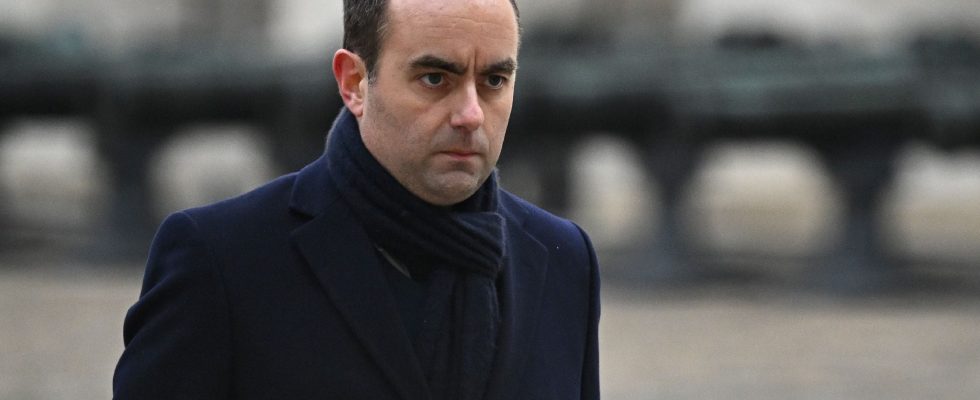Sébastien Lecornu raises his voice against industrialists. The Minister of the Armed Forces announced this Tuesday March 26 that it was not impossible for the State to impose requisitions on them to accelerate military production, particularly as part of support for Ukraine against Russia. “For the first time, I do not exclude using what the law allows the minister and the general delegate for armaments (DGA) to do, that is to say if the account was not there in terms of production rates and deadlines, to make requisitions if necessary or to exercise the right of prioritization”, affirmed the minister during an unprecedented press conference in the presence of all the chiefs of staff .
Paris is urging the French defense industry to produce more and more quickly to meet the needs of its army and ensure long-term support for Ukraine. And for this, requisitions, “the hardest tool in our legal arsenal”, in the words of Sébastien Lecornu, are now part of the possible responses considered.
The requisition framework expanded since 2023
Requisitions may concern personnel, stocks or production tools, or even goods and services, which would be seized by the State for vital strategic reasons. Included in the Defense Code without modification since 1959, the vote on the military programming law last summer modified their possible implementation.
From now on, instead of only being applicable in the event of mobilization on the territory, a requisition can now be decided by the government “in the event of a threat, current and foreseeable, weighing on activities essential to the life of the Nation, to the protection of the population, territorial integrity” or “of a nature to justify the implementation of the State’s international commitments in matters of defense”.
In other words, requisition no longer only concerns threats on French territory, but also aims to adapt to all the challenges and threats involved in modern conflicts, whether “cyberspace (paralysis of networks) , space (destruction of satellites), the seas (destruction of submarine cables and gas pipelines)” and others, explained public law professor Jean-Paul Markus at Franceinfo last July.
“It is not the priority tool”
These requisitions are not yet on the agenda, and are above all a last resort. “It is not the priority tool as I speak to you”, wanted to temper Sébastien Lecornu. “But I tell you that it exists because it also creates readability for everyone, there will be no surprises.”
But this looks like a real warning shot against manufacturers, who could already see themselves targeted by initial restrictions. The Minister of the Armed Forces is therefore considering, “in the coming weeks”, imposing minimum stock levels on some of them, in order to produce more quickly, or to give priority to military orders in the face of civilian needs. .
“If sometimes production rates are too slow, it is because there is a temptation to operate just in time and not have enough stocks of raw materials or components”, in order to avoid immobilize cash to build up these stocks, he explained.
Aster missiles in the crosshairs
In his sights in particular, the delivery times of the long-range Aster anti-aircraft missile produced between France and Italy by MBDA, which are too long in the eyes of the minister. “The question of prioritizing the military order among MBDA subcontractors for the Aster missile, in priority over a civilian order, is something which is obviously completely understandable,” he said.
Paris placed an order for 200 Aster missiles in January 2023 for 900 million euros, with their delivery scheduled for 2026. However, these missiles, which previously “were not used or only for training purposes” according to him , are supplied to Ukraine to defend its skies and have been fired 22 times against Houthi drones and missiles since December by the two French frigates deployed in the Red Sea. “Now, we have concrete operational contracts on which we have a request,” he insisted, announcing an “advance order” of 200 additional Aster missiles. It now remains to be seen whether or not these pressures will be followed by action.
“Failed” contracts
The minister also regretted that France had recently “missed” several contracts in Eastern Europe, without giving further details. “We have customers in a hurry,” in a region that feels threatened by Russia and shares borders with Ukraine, he recalled. Once again, the minister called on manufacturers for a “cultural break” to accelerate the delivery of military equipment. The level of orders in 2023 reaches 20 billion euros compared to 15 billion on average over the period 2017-2022.
The roundtable to finance the acquisition of 78 Caesar cannons for Ukraine as part of the artillery coalition is also finished and they will be able to be delivered “rapidly”, he announced. France has set itself the objective of producing 100,000 shells, including 80,000 for Ukraine in 2024. Concerning the financing of new orders, the minister specified that through the game of deflation, “significant room for maneuver will be recovered” in 2024. The room for maneuver will be used for aid to Ukraine, he concluded. It now remains to be seen whether or not these pressures will be followed by action.
